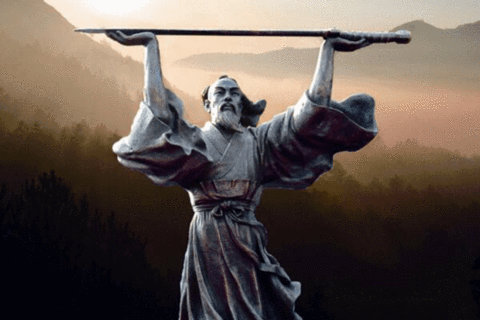By lyuesword | 14 December 2020 | 1 Comments
The Swordmaking Heritage of Longquan
The Quest of A King
Legend has it that an ancient ruler of China, King Chu, once called the greatest swordsmith of the land to make him a few masterwork weapons. That man’s name was Master Ou Yezi. Ou heeded the King’s command and traveled far and wide, looking for a place in which he could make such weapons. He finally found a suitable place – one with plentiful iron for smithing, special water for quenching, and suitable stones for grinding. The name of the place was Longquan.

There, Master Ou spent three years of labor, painstakingly crafting the blades the King wished for. In the end, he created three swords: Longyan, Tai’e, and Gongbu. The first sword, Longyuan, means “Dragon Abyss”, and was named such because its shape reminded the viewer of someone standing at the top of a tall cliff and looking down. The second sword, Tai’e, means “Great Mountains”, and was named so because its soul existed in the mountains where the sword was forged before being contained in the sword. The last, Gonbu, meant “Exquisite Cloth”, due to it feeling as smooth as silk when touched. The King was pleased with these swords, and Master Ou’s name has been revered among Chinese swordsmiths since that day.
LongQuan
Nestled by the tallest mountain in the province, the town of Lonquan still holds much of its ancient beauty. Surrounded by forest and a nearby a river, this quiet town contains the top swordsmiths of China. Supposedly the water in the river has minerals that react with the sword during quenching to enhances its sharpness and resilience.
Getting there is a journey – there are no airports or major transport hubs. Once there, one can visit the many swordsmithies in the area. Swordsmaking is a tradition handed down from master to apprentice that has been passed on for centuries. Unfortunately, this tradition is in danger as fewer apprentices choose to make swordsmithing their career due to the hard work and low pay, instead choosing to look elsewhere for job opportunities. The quality of Longquan swords is unmatched, with local smordsmiths having made swords for foreign leaders, movies, and for wealthy clients who can afford to pay for the months of work it can take to make just one high-quality sword. The swordsmithing of Lonqquan has been recognized as an Untangible Cultural Heritage of China.

Fun Facts
The ancient name of Longquan is actually Longyuan (the same name as the first legendary sword made by Master Ou Yezi). Due to a later leader named Yuan, the name was changed out of respect and to avoid naming conflicts.
The art of swordsmithing was originally imported into Japan from China. Now history has come full circle, with Chinese smiths having imported the knowledge from Japan for making Katana and other Samurai Swords.
Our Swords
All of our swords come from Lonquan, guaranteeing their high quality. It gives us pride to work with smiths from such a distinguished heritage.

Want a unique sword? Feel free to contact us:
Email: lyuesword@hotmail.com
Website: www.lyuesword.com
Custom Sword Page: www.lyuesword.com/Custom-Sword/customization-options/Create-Your-Own-Swords
Legend has it that an ancient ruler of China, King Chu, once called the greatest swordsmith of the land to make him a few masterwork weapons. That man’s name was Master Ou Yezi. Ou heeded the King’s command and traveled far and wide, looking for a place in which he could make such weapons. He finally found a suitable place – one with plentiful iron for smithing, special water for quenching, and suitable stones for grinding. The name of the place was Longquan.

There, Master Ou spent three years of labor, painstakingly crafting the blades the King wished for. In the end, he created three swords: Longyan, Tai’e, and Gongbu. The first sword, Longyuan, means “Dragon Abyss”, and was named such because its shape reminded the viewer of someone standing at the top of a tall cliff and looking down. The second sword, Tai’e, means “Great Mountains”, and was named so because its soul existed in the mountains where the sword was forged before being contained in the sword. The last, Gonbu, meant “Exquisite Cloth”, due to it feeling as smooth as silk when touched. The King was pleased with these swords, and Master Ou’s name has been revered among Chinese swordsmiths since that day.
LongQuan
Nestled by the tallest mountain in the province, the town of Lonquan still holds much of its ancient beauty. Surrounded by forest and a nearby a river, this quiet town contains the top swordsmiths of China. Supposedly the water in the river has minerals that react with the sword during quenching to enhances its sharpness and resilience.
Getting there is a journey – there are no airports or major transport hubs. Once there, one can visit the many swordsmithies in the area. Swordsmaking is a tradition handed down from master to apprentice that has been passed on for centuries. Unfortunately, this tradition is in danger as fewer apprentices choose to make swordsmithing their career due to the hard work and low pay, instead choosing to look elsewhere for job opportunities. The quality of Longquan swords is unmatched, with local smordsmiths having made swords for foreign leaders, movies, and for wealthy clients who can afford to pay for the months of work it can take to make just one high-quality sword. The swordsmithing of Lonqquan has been recognized as an Untangible Cultural Heritage of China.

Fun Facts
The ancient name of Longquan is actually Longyuan (the same name as the first legendary sword made by Master Ou Yezi). Due to a later leader named Yuan, the name was changed out of respect and to avoid naming conflicts.
The art of swordsmithing was originally imported into Japan from China. Now history has come full circle, with Chinese smiths having imported the knowledge from Japan for making Katana and other Samurai Swords.
Our Swords
All of our swords come from Lonquan, guaranteeing their high quality. It gives us pride to work with smiths from such a distinguished heritage.

Want a unique sword? Feel free to contact us:
Email: lyuesword@hotmail.com
Website: www.lyuesword.com
Custom Sword Page: www.lyuesword.com/Custom-Sword/customization-options/Create-Your-Own-Swords
Recently Reviews
Read MoreLeave a Reply
Your email address will not be published.Required fields are marked. *